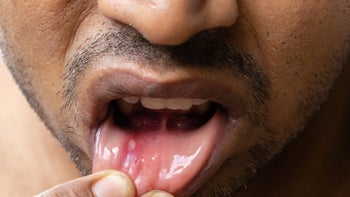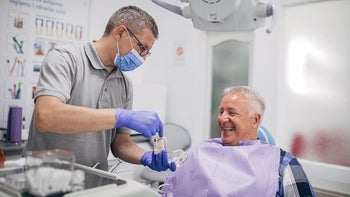
How Much Does Wisdom Teeth Removal Cost?
Key takeaways:
If you need to have your wisdom teeth removed, you can expect to spend from $200 to $1,100 per tooth without insurance.
Erupted teeth are typically the least costly to extract, while impacted teeth usually cost more.
The cost of wisdom teeth removal varies greatly depending on the details of the procedure.
Table of contents

Your third set of molars — also known as your wisdom teeth — are the last teeth to emerge at the back of your mouth. Most people have four of them. And they usually begin to erupt in the late teens or early 20s.
If wisdom teeth come in healthy and aligned correctly, they usually don’t require special care. So why is wisdom teeth removal one of the most common dental surgeries? Often, the procedure is needed because there’s not enough room in a person’s mouth for the teeth. Or a dentist predicts there won’t be enough room once the teeth grow in.
If there isn’t space for a wisdom tooth, it can become impacted — meaning, it doesn’t fully erupt from the gum. According to the American Association of Oral and Maxillofacial Surgeons, about 90% of people have at least one impacted wisdom tooth, which can lead to decay, plaque buildup, and infection.
Search and compare options
In general, wisdom teeth can cause problems if:
They are impacted (fully or partially stuck below the gumline).
They crowd other teeth, make them crooked, or jeopardize their health.
They develop cysts that can harm the jaw.
They cause inflammation, cavities, or other types of dental disease.
Wisdom teeth removal can help prevent these problems. But just because it’s a common procedure doesn’t mean it’s not costly. Wisdom teeth removal expenses can quickly add up, especially if one or more wisdom teeth are involved.
How much does wisdom teeth removal cost without insurance?
Wisdom teeth removal costs can vary based on several factors, including how many teeth are being removed. According to CareCredit, which offers a medical credit card that covers dental services, the cost of getting all four wisdom teeth removed can range from $1,200 to $4,175.
Prices at the lower end of that range are generally for erupted or partially erupted teeth at the gumline. Meanwhile, prices at the higher end are usually for impacted teeth, which are stuck under the gumline or in the jawbone. The price can also increase with complications, such as a dry socket during recovery.
For simple extractions of erupted wisdom teeth, you can expect to spend an average of $300 per tooth — though, the cost can range from $200 to $700 per tooth. Meanwhile, the range for impacted teeth is $250 to $1,100 per tooth, with an average cost of $350 to $550 apiece.
Why sooner is better than later with wisdom teeth removal: If your wisdom teeth need to go, early extraction can save you both pain and money.
A speedy recovery depends on aftercare. Learn about strategies that can help you recover quickly after getting your wisdom teeth removed.
What to eat after getting your wisdom teeth removed: Here’s a list of soft, protein-rich foods you should consider adding to your diet as you recover.
What factors affect how much you’ll pay for wisdom teeth removal?
Below are factors that could affect your out-of-pocket costs for wisdom teeth removal.
Condition of your teeth
Erupted teeth, which have fully or partially emerged from the gums, are simpler to remove because they’re easier to access. By contrast, since impacted teeth are stuck under the gumline or in the jawbone, they can’t just be pulled out with local anesthesia.
To remove an impacted wisdom tooth, your dentist or oral surgeon may need to give you sedation and then make an incision in your gum tissue to reach the tooth. Compared to removing an erupted tooth, this requires more resources, time, and skill — which adds up to a higher cost.
Number of teeth needing extraction
As noted above, extractions are often priced per tooth. So, if only one of your wisdom teeth is causing you trouble, it’ll cost less than having all four of them taken out. Your dentist will let you know which teeth need to go and which ones are optional.
Type of anesthesia
When removing wisdom teeth, dentists typically use local anesthesia to numb the area around the teeth. The cost of extractions typically includes this local anesthesia. However, that isn’t your only option.
You can also choose sedation via an oral medication, IV medication, or gas such as nitrous oxide (also known as laughing gas). A sedative can help you stay calm and relaxed during the surgery.
If you have multiple impacted wisdom teeth, your dentist may prefer to perform the extractions while you’re under general anesthesia. This means you’ll have IV medication to keep you asleep.
Your age
Wisdom teeth removal tends to cost more if you’re older. That’s because we develop denser bones as we age, which can make the surgery more difficult — increasing the price. When you’re a teen or young adult, the bones in your mouth are softer, which makes surgery easier.
Where you live
Wisdom teeth removal usually costs more in larger cities. To get a ballpark price for the procedure in your area, try using Delta Dental’s cost estimator.
Will insurance cover the full cost of wisdom teeth removal?
Dental insurance usually doesn’t cover the entire cost of wisdom teeth removal. In most cases, consumers are responsible for paying a percentage of the bill and their insurance company covers the rest.
If you have dental insurance, your policy will dictate exactly how much you’re responsible for paying. For example, if your plan has 100/80/50 terms, your insurance will cover 100% of preventive care, 80% of basic procedures, and 50% of major procedures. If your wisdom teeth have erupted, the extractions may be considered a basic service, meaning you’re only responsible for 20% of the costs. But if they’re impacted, there’s a good chance you’ll have to pay 50% of the costs.
Note that most dental insurance plans also have an annual maximum for what they’ll cover. If you’re getting all four teeth removed, the cost may exceed your plan’s limit. You’d then be responsible for paying 100% of the charges above your annual maximum.
Medicaid usually covers wisdom teeth removal for children. Half of states and the District of Columbia have Medicaid programs that offer comprehensive dental care for adults.
Original Medicare doesn’t cover dental work, including the extraction of wisdom teeth. However, some Medicare Advantage plans include dental benefits that may cover this procedure.
What can you expect to pay out of pocket for wisdom teeth removal?
If you don’t have dental coverage, you’ll be responsible for all the costs associated with your wisdom teeth removal. This includes the cost of getting your teeth pulled and expenses such as:
The initial exam and imaging: You’ll need a consultation and a set of panoramic X-rays before your dentist or oral surgeon can remove your teeth. You can expect to pay about $100 on average for the exam and $100-$250, on average for the X-rays.
Anesthesia: Sedation can cost $100-$500, depending on how conscious you want to be during the procedure. For general anesthesia (deep sedation with IV medication), you will need to see a dental professional who has completed a residency in oral surgery or dental anesthesiology.
Pain medication: Most dentists recommend alternating between over-the-counter acetaminophen (Tylenol) and ibuprofen (Advil or Motrin) to help with the pain of wisdom teeth removal. Though, some people may need prescription pain medication, which is more costly. If you need help affording your medication, consider using a free GoodRx coupon.
Follow-up visits: You’ll have to pay for follow-up visits if the cost isn’t bundled into the price of your surgery.
Potential issues that cost extra
If you have issues related to getting your wisdom teeth removed, you may need additional treatment, which will cost you more:
Dry socket: This is one of the most common complications of wisdom teeth removal. It occurs when the blood clot that forms in the socket after surgery dislodges early. If you develop dry socket, you’ll likely need to return to the dentist so they can apply a special zinc oxide paste. This usually costs $50 or less.
Infection: If your wisdom tooth was infected, which may have been known before surgery or discovered during the procedure, your dentist might prescribe you antibiotics such as amoxicillin or clindamycin. You may be able to get the generic version of either of these medications for less than $15 with a GoodRx coupon.
How can you lower the cost of wisdom teeth removal?
There are a few things you can do to reduce the price of getting your wisdom teeth removed:
Have all of your wisdom teeth that need to come out removed at the same time. Ask about a package discount for getting all four wisdom teeth removed at once. This can save you time away from work and money on anesthesia.
Use local anesthesia instead of general anesthesia. If your dentist or oral surgeon agrees, using only local anesthesia could save you money.
Find a dental school nearby. You may be able to get high-quality dental services for much less.
Join a discount dental program. Though not the same as dental insurance, this type of savings program can bring your costs down. Ask your dentist for recommendations.
Get billed for the exact amount. Choose a dentist who bills you precisely for the amount of anesthesia used, instead of billing for the maximum amount allowed by your insurance.
Frequently asked questions
Here are some questions to ask your dental professional if you suspect you need your wisdom teeth extracted:
How many third molars (wisdom teeth) do I have?
What is the condition of each of my wisdom teeth? Are they erupted, impacted by soft tissue, or impacted by bone?
Why should I or shouldn’t I have my wisdom teeth removed?
What are the risks of the procedure versus keeping the teeth?
If I choose to keep my wisdom teeth, what changes do I need to make to my oral care routine?
Yes, it’s possible to find financing options to help with the cost of your wisdom teeth removal. Your dental professional may accept medical credit cards like the ones through CareCredit. Some dental chains offer financing as well as dental savings plans.
Alternatively, you may be able to save money on your dental care by using tax-free funds from a health savings account (HSA) or flexible spending account (FSA).
No, there is some disagreement about whether healthy wisdom teeth should be removed. The American Public Health Association opposes the routine removal of wisdom teeth because of the risk of injury, while the American Association of Oral and Maxillofacial Surgeons supports “surgical management” of wisdom teeth that could cause an issue if not removed. The American Dental Association recommends extraction of partially erupted wisdom teeth when there’s a chance of infection, damage to adjacent teeth, or issues from cysts.
The bottom line
Having wisdom teeth removed can cost between $200 and $1,100 per tooth, depending on the condition of the teeth and whether you have all four removed at once. Impacted teeth cost more since they’re harder to remove and typically require sedation. But there are several other factors that can impact the cost.
Why trust our experts?



References
American Association of Oral and Maxillofacial Surgeons. (2016). Management of third molar teeth.
American Public Health Association. (2008). Opposition to prophylactic removal of third molars (wisdom teeth).
Aspen Dental. (n.d.). Wisdom teeth removal cost.
Cigna. (n.d.). Discount dental programs.
Columbia University College of Dental Medicine. (n.d.). Wisdom teeth.
Delta Dental. (n.d.). ADA rules for sedation.
Delta Dental. (n.d.). What does my dental insurance cover?
Direct Benefits. (2023). How much does wisdom teeth removal cost with or without insurance?
Dwilson, S. (2024). How much does wisdom teeth removal cost? CareCredit.
Ghaeminia, H., et al. (2020). Surgical removal versus retention for the management of asymptomatic disease‐free impacted wisdom teeth. Cochrane Database of Systematic Reviews.
Harchandi, D., et al. (2024). How much is wisdom tooth extraction in 2024? Authority Dental.
McKenna, N., et al. (2024). What is a dry socket? Authority Dental.
Medicaid.gov. (n.d.). Dental care.
Medicare.gov. (n.d.). Dental services.
MedlinePlus. (2022). Impacted tooth.
MetLife. (n.d.). Frequently asked questions about the removal of third molars (wisdom teeth).
MouthHealthy. (n.d.). Wisdom teeth.
Schroeder, A. R., et al. (2022). Estimated cumulative incidence of wisdom tooth extractions in privately insured US patients. Frontiers in Dental Medicine.

























